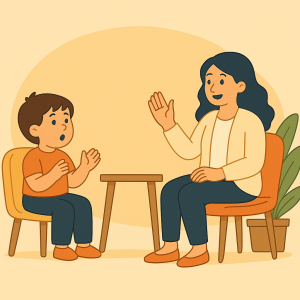What are the strategies for Test Preparation?
By Prapoorna M
Last Updated: November 26, 2021
How to prepare for a test by reducing test anxiety?
In order to reduce your test anxiety, it is a better idea to practice some test questions. Formatting test questions and practising by taking tests make your mind consider the test as a common thing to encounter. As you get a habit of it for some days before your examination, your test anxiety will ward off. Let’s see how this has to be done. Guidelines for the practice test questions strategy.
Consider the types of questions
Find out what types of questions will be asked on the test: essay, multiple choices, true-false, etc. Look on the syllabus, ask the teacher, examine old tests, or talk with former students in the class.
Write practice questions
There are several approaches to writing practice questions. Turn the section headings in the book into questions. Take sets of related pieces of information and write questions focusing on that relationship. Look for the main ideas presented in each class and form them into questions. Change the numbers given in math problems and rework them. Ask the teacher for a few sample questions to get an idea of the how he/she writes questions.
Sources of practice questions
The main sources of practice questions could be old exam papers, review questions at the end of each chapter in the textbook, and student workbooks accompanying the text. Because writing one’s own questions requires thorough examination of the test material, students should attempt to move in this direction as they become more proficient.

Record the questions
Depending on personal learning strengths and preferences, students may choose to record the practice questions as a list on paper, individually on flash cards, or as a list on audio cassettes.
Answer the questions
There are three options at this stage. Students may answer the questions as they write them. Or, students may answer the questions later, using the notes and readings as references. In either case, students may want to record the page numbers on which the answers are found in the notes or book. The third option is to use the questions as a practice test after reviewing for the exam. This is done without the use of notes or other study materials.
Record the answers
Again, students may record the answers on paper, flash cards, or audio
tapes.
Review the answers periodically
To be really effective, practice questions should be reviewed periodically to test recall and to improve understanding. Look at the flash cards during break time between classes. Listen to the tapes while traveling to school.
Change the order
Shuffle the questions so the information is not learned in a particular order. This insures that one is actually learning the information itself, rather than order of questions and answers. This also helps one to prepare for tests in which the questions are arranged oddly; teachers don’t always arrange questions in the order in which the information was covered in class.
Practice
It takes time to gain proficiency in this strategy. Both writing the questions and predicting what might be asked on the test require practice. These skills should improve as students are exposed to a variety of tests and as they learn more about their teachers’ test-writing habits. Don’t lose heart when your questions don’t appear on the test. If you’ve used the strategy effectively, chances are you know the material well enough to answer different questions.
Test content and procedures
The following information must be known in order to form an effective test preparation plan. Different strategies must be used for different testing situations. The most common concerns include: place and time of test administered, topics, chapters, will be covered on the test, kinds of questions essay, identification, multiple choice, etc. will be asked, level of detail the teacher expect in the answers and look for accurate regurgitation of memorized facts or for interpretation of information, deduct points for spelling or grammar mistakes.
Examine the syllabus
Many of the above-mentioned questions can be answered simply by checking the syllabus. Most teachers describe testing procedures, including the types of questions and the supplementary materials permitted, in the syllabus. Look at the course schedule; topics listed here will probably appear on the test. Check the syllabus before meeting with the teacher; he/she may be put off if you ask questions whose answers are clearly indicated in the syllabus.

Ask the teacher
One of the best ways to clarify expectations is to consult with the teacher well in advance of the test. Ask for clarification during or after class. Have a list of questions ready to ask when you meet with the teacher. In some cases, the teacher will reward you with information just for coming to see him/her. But if the teacher seems hesitant to answer questions related to the topics or ideas on which the exam focuses, don’t press him/her and doesn’t offer more clarification, check the syllabus, old exams, the book, or talk with other students for insights.
Look at old tests
Old exams are a valuable source of information concerning the topics or ideas emphasized, the types of questions asked, the way questions are worded, the level of detail the teacher expects in answers and grading procedures.
Consult with other students
Talk with those students who have taken the class before. Not only may they have old tests, but they may provide insights into teacher expectations, main ideas, and grading procedures. Current classmates may have ideas about the major topics to study.
Use the textbook
Most texts provide review questions at the end of each chapter or unit. These should give ideas of what may be asked on the test. Or try turning the chapter headings into questions. Check the index listing of people and concepts; the more page references, the more important the idea.
Use text workbooks
Student workbooks that accompany the text are an excellent source of review questions for the reading material. They can give you an idea of what topics might be covered on the exam and what the questions may look like.
Test preparation strategies
Test preparation strategies are intended to help students use study time as effectively and efficiently as possible to improve student performance on exams and also to improve exam scores.
When you take any test you’re really being tested on two things:
- How much you know about the subject?
- How much you know about taking a test?
When students are prepared for exams, they tend to be more confident
and perform better.
General Strategies
The below mentioned general test preparation strategies, may be used
to prepare for any type of exam.
Develop a plan of action
Develop a plan for exam preparation well in advance of the test.
Any combination of these activities may be included in the study plan:
- Complete reading assignments
- Complete lab assignments
- Complete homework problems
- Meet with the teacher
- Meet with study group members
- Reorganize or recopy class notes
- Review information in the notes and the readings
- Prepare study aids (flash cards, practice questions, visual aids,
- etc.).
The activities selected will depend on the type of test and personal
learning styles.
Budget your time
Time management is the key to avoiding the drawbacks of cramming. But remember that the amount of time spent studying for an exam is not as important as what one does during that time. Estimate how long it will take to complete each of the activities in the preparation plan.
Organize your hours to include sufficient time for completing the activities, relaxing, and sleeping. Make up a schedule and stick to it. Break down the exam preparation time into manageable amounts to avoid boredom and loss of concentration. Sessions lasting twenty to thirty minutes are always the best. Mix up activities (outlining, reviewing, organizing, etc.) so that the information is processed in a number of ways. Studying for six half-hour sessions is much more effective than studying for three straight hours.
Reduce and organize information
Time spent on reducing the information to major ideas, key words, and key phrases is well spent. Reduction should be followed by organizing, or providing a logical structure to the information. Not only will reducing and organizing cut down the amount of information to be remembered, it will also provide memory triggers during the exam. Start by reviewing the main ideas in general terms. Know how the major topics are related. Then focus on the details for each major idea. Begin to prepare early.
Ideally, exam preparation should begin the first week of class or immediately after the last test. By starting early, information is stored in long-term memory and test anxiety is reduced. Use spare time wisely.
The night before the test
If one has prepared wisely for a test, spacing reviews and beginning the preparation early, then the night before the test may be reserved for a final, relaxed review of the material. Your rewards will be a good night’s sleep, a positive attitude about the test, and reduced anxiety.
Prepare Psychologically
Don’t resist the test, even if you believe tests are useless and unnecessary. Concentrate, and block out all distractions. Review your plan for completing the exam. Picture yourself in the testing situation. Imagine you are calm, cool and collected. Picture yourself scanning the test paper, knowing all the answers, and turning in a passing test. If anxiety is still felt, use the relaxation techniques to control feelings of anxiety. Avoid depressing or irritating situations before the test. Picture yourself walking out of the room at the end of the exam having turned in your very best work.
Assemble the Necessary Supplies
Gather and organize all the supplies you will need the day before the test. This includes pens, sharpened pencils, eraser, calculator, ruler, student ID card, and a watch.
A thorough preparation opens a welcome gate to success. In order to have an expert help on controlling anxiety, book an appointment today to have an online or offline counselling session.
Book your Free Consultation Today
Parent/Caregiver Info:
Client’s Details:
* Error Message







